Silver Wordsmith: An author's journey |
|
Writing away so furiously for the last year, it almost comes as a surprise when I look up and realize I’m nearing the end of the first draft of my second novel. My first novel, meanwhile, languishes in editing purgatory, but let’s say no more on that for now, and focus on the positives.
The thing about Maple Vodka, which remains its working title because I’m nowhere nearer to figuring out what this book will actually be called, is that it’s one of those projects that has been with me far longer than it has taken to write. The idea for it started ages ago – back when I was in my short-lived screenwriting phase, which means it’s been with me for a good fifteen years now. This novel has been brainstormed, outlined, plotted, started and restarted, into absolute oblivion until I finally said enough is enough and that the first draft will be written one way or another. I feel like it wasn’t that long ago that I was on here saying that the wheels finally started turning and that I had a legitimate project on my hands. And now my main character is on a plane flying towards his climax, which will soon hit him over the head like a ton of bricks, and then off to the denouement, which shouldn’t take that long. If I had to guess, I’d say I should be done before the end of the year, or the very least would close off this draft before the end of February. Once I’m done that, it would be two novels whose first draft I have written, which, to me, is pretty crazy to think about. Five years ago, I was still struggling with ever finishing one novel, writing only short stories and novel projects that were abandoned before their completion. And now this would mean that I’ve run the marathon that is writing a novel not once, but twice. It means I’ve proven that I can do it, and which means I can do it time and time again. Actually completing a novel, on the other hand, is a different question. As I’ve said, novel number one remains in editing mode, and I’ve recently talked about which projects are stealing the time away from that. Adding another novel into the mix complicates things, and I don’t know yet how will be able to find time to edit both Maple Vodka and Wake the Drowned. However, that just feels like one of those problems that will find a solution as some point, so I just need to be patient. What I should be focusing on right now is wrapping up a plot that has been with me nearly half my life. Scenes I imagined for over a decade are about to finally be put into words and I want to do them justice – bring them to life in the exact ways that imagined them. One way or another, the wait is about to pay off and the story of Paul/Pavel will draw to a close. What lessons will our protagonist learn from one day waking up and finding himself in an alternate universe where he never immigrated from Russia as a kid, which led to his life and even himself, turning out quite differently? I mean, I know the answer. I just hope one day you get a chance to read it for yourselves.
0 Comments
With the writing productivity I’ve been having since last year, it’s no surprise that I’m hitting milestones with all my projects. A few nights ago though, I managed to hit two major ones in the same hour – my destined-to-be-a-web-novel fantasy called The Second Magus crossed 50K words, while my second novel whose working title is Maple Vodka has hit 80k.
With The Second Magus, all I had originally set out to do, was to try to bolster my readership for the Bloodlet Sun on Royal Road by producing something in a genre that was more popular on that website and then hoping for some cross-promotion. I started writing it last December and already I’m at 50K, which is hallway into a decent novel length (maybe not so much for epic fantasies, but I’ve got no interest in writing something so voluminous). What I didn’t expect to happen was just how invested I would become in this. In order to accomplish my original cross-promotion goal, I dusted off an idea I’d been brewing for years, and decided to build something on top. Much to my surprise, I ended up building way more than I bargained for. The amount of story I have going on in my head – I’d barely scratched the surface with these 50K words. And what was supposed to have been a side project, feels very real now. I’ve got the kind of feelings for this story that I have for my long-term projects like my first two novels and The Bloodlet Sun. I want nothing more than for my baby to succeed and I’m putting in as much effort as I can in order to see it happen. I’m very excited to have shepherded The Second Magus to that much content in less than a year, and I’m getting more and more pumped about eventually releasing it. Last estimated debut date was sometime in September, but now I’m thinking I’ll be lucky if I can get it out the door by early November. For my second novel, the reason I care about the 80K milestone is because that is generally considered the healthy minimal threshold for the length of a contemporary fiction novel. I’ve recently run into issues with word count on my first novel, since from a 96K I managed to edit it down to 71K, and now have to figure out how to get the word count up without looking like I’m forcing it. So reaching something like 80K on my second novel doesn’t mean I’m out of the woods yet, since I can always pare it down to less than that, but there’s still a few things to consider here: one, is that there’s still plenty of plot left to tie up, so if I had to guess, first draft will clock in between 100K and 110K, and two is that with all this extra word count I will have a pretty decent cushion to edit myself down to something that is still novel length, and finally, it’s just the sense of relief of being there again – having a manuscript that’s long enough that it can be a novel. They always say that writing a novel is the marathon of writing accomplishments, and now being in that territory for the second time feels like an important hurdle has been jumped. It’s not some mysterious once-in-a-lifetime event for me anymore, but something that I can do, and something that I can tell myself that I can do over and over again. If I had to guess, I’ll end up finishing the first draft of this novel either before the end of this year or early into the next one, and then off into the editing process, which is another mental hurdle I’m yet to clear, but that’s a future me problem. For the time being, I’ll just bask in my current milestone, and stoke the excitement that comes from actually accomplishing something instead of just endlessly throwing words onto paper.
I’ve noticed a curious trend in my writing recently to do with the setting of my stories. First question of course is how does one “notice” their own trend, aren’t I the one setting them? To that I answer that you’d be surprised what you don’t notice about your writing until you’ve had a chance to step back and take a look. Specifically, in my case I’ve been setting more of my stories in Russia, and with a particular slant to them as well.
Thinking back on my high school churn of short stories, I can’t recall any of them being explicitly set in Russia except one – the mostly autobiographical story of a kid with a heart condition trying to play hockey (don’t worry folks, knock on wood but this seems to have resolved itself – the heart condition, not the hockey, which is an affliction that refuses to leave me). There was another one that was loosely based on the events of one of the bombings of the Russian parliament in the early post-Soviet Union days, but it was set in an otherwise nameless fictional European country. An odd pattern give how much of writing advice is “write what you know”. This seems to have begun to shift in the past few years. Firstly, my second novel that I’m currently 70K words into is set predominantly in Russia. You can read more about it here but the gist is that someone who immigrates from Russia as a kid wakes up in his mid-twenties back in Moscow living the life he would have supposedly led if he had never left. Some parts are set in Canada, but otherwise it’s a Russian-set novel through and through. Secondly, my third long-form writing project, which recently surpassed 15K but is still in the experimental stage is an autobiographical (or possible semi-autobiographical, since I’m still toying with this) accounting of my relationship with my father set against my immigrant experience. Most of this takes place in Canada but since I immigrated after I’d turned thirteen Russia plays a prominent role here as well. And finally are my short stories. My production of these has slowed down considerably and I think on average I’ve completed about two a year for the last few years. Still, two out of the last four that I’ve worked on are set exclusively in Russia, with a curious common theme between them. The one that I completed last year, “Grisha and Kolya”, follows two kids, one who has a developmental delay and the other who bullies him regardless, not for his disability, but his perceived class privilege. The other, "Snowdrops", is about an older woman living by herself just above the concrete overhang of a Soviet-era apartment block and her struggles with a juvenile delinquent who keeps throwing things out of their apartment to smash right outside her window. Both of these stories are pure fiction, but draw heavily on my own experience in Russia, including elements of myself lurking in the background, as I use the stories to try to deal with some of of the mistakes from my childhood. It’s a shift to be sure, and not entirely a mysterious one. High school wasn’t exactly an encouraging environment for me to explore my Russianness, as I found mostly what my identity earned me was a heavy dose of bullying. This time in my life I was trying to figure just how “Canadian” I could be given my background, and learning how heavy the first part of the hyphenation of “Russian-Canadian” would be. Over the years, like Canadian society has finally begun to do, I’ve started moving past the “hyphenated” identity, allowing both to exist independently in the amounts that are true to myself and not some externally-dictated vision of what I should be. I think for this reason I’ve felt more comfortable drawing on my Russian influence directly, since each foray no longer threatens to envelop me in an identity crisis in the same way. I’m excited as to where this new direction in my writing will lead me. My favourite author, Kazuo Ishiguro, set his first two novels in Japan, even though he emigrated from that country at the age of five. Not to say that I’m anywhere close to expecting the same kind of success, but it’s a great source of inspiration, and who’s to say what will happen next.  Make sure you flesh out each element to achieve a fully working solar system Make sure you flesh out each element to achieve a fully working solar system
Sometimes it’s easy to get swindled by our protagonists. They are the chosen heroes of our story – it is their challenges, their accomplishments, their growth that gets spotlighted, and for this reason, they’re prone to getting a fat head. The plot revolves around them, therefore they’re the most important being in this universe and every other character is merely a tool whose entire existence revolves around the protagonist.
Don’t believe their lies. Your protagonist may strut around like a peacock, drowning out every supporting character with the massive egos, but as the writer, you need to be smarter than that. If a supporting cast does nothing but offer themselves up to the protagonists’ story, then they’re no longer characters but props – toys to be played with by a spoiled child. If everyone around the protagonist sacrifices their agency to the protagonist’s needs, then they no longer feel real, and the world around the protagonist collapses. I’ve recently encountered this issue in my second novel. The most important non-protagonist character in my book was spending some time with the main character and I started to find that everything she did or said was specifically geared for the MC’s story. Everything she said boiled down to prompts for the protagonist to reveal his feelings and motivations. Everything she did seemed to have followed what the protagonist was doing. It was a perfect recipe for not only having a weak character, but also for establishing an unhealthy gender dynamic between the characters. When I found myself writing another dialogue where the opening line was the other character asking the MC a question about his life, I knew that I was on the wrong path. I hadn’t exactly uncovered a new problem – strong realistic support characters are a hallmark of good writing – it’s just that I recognized the flaw in my current WIP. But knowing that something is a problem is a far cry from fixing it. So here’s my proposed solution to resolving this particular shortcoming – imagine your supporting characters as protagonists of their own work. We are all the heroes of our own story. Realizing this and reminding ourselves of it regularly is how we practice empathy, and so too it should go for fictional characters. Everything in your book revolves around your protagonist, they are the sun of your story. But planets that orbit the sun are centres of their own systems – they have their own moons revolving around them. What you need to do is flesh those moons out, and don’t forget about them when writing interactions between your characters. So the approach I took is taking a moment to imagine if I was writing a book about the protagonist’s friend instead – what is her current main conflict, what are her goals, how are those goals being met or not, how do the actions and words of the protagonist impact her story? It’s not like I haven’t thought of a backstory for her before, so she didn’t exist in a vacuum. A backstory, though, places too much emphasis on the “back” – focusing on what led her to the events of the book, but then losing sight of their continued existence as the story progresses. For this reason, I want to think of it more as a concurrent-story – the life the supporting cast is leading while occasionally intertwining with the main plot. It’s almost like a subplot that never makes it into the main work. Having gone through this exercise, I found that the dialogue now flowed more naturally and smoothly. The opening of the conversation was no longer protagonist-driven, but rather led by the thoughts and feelings of the supporting character. I maintained the depth I’d developed for her without subsuming it to the main character’s story. Next time I’ll make sure to keep my eye on this for the entirety of writing process. So the next time you’re writing, might I recommend keeping track of these “supporting character as protagonist” stories in parallel to your main plot, and you’ll find yourself a much stronger cast of characters. 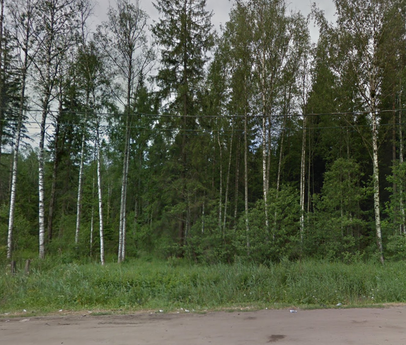 Never realized how much I miss birch until revisiting this highway from Moscow to Tver. Copyright: Google Never realized how much I miss birch until revisiting this highway from Moscow to Tver. Copyright: Google
A few months ago, I came on here to extoll the virtues of bolstering your writing with Google Street View – sinking into the locales you want to write about without having to actually be present there. I also said that there are limitations to this method, as one never quite gets the feel for a place through static images. In my case, I had been using it for walkabouts of Moscow and reminding myself of places I hadn’t visited in more than twenty years, using Street View more to document changes and to jog my memories.
The plot of the same novel that required descriptions of Moscow has now moved beyond the city limits, following the route from the city to the remote village in the Russian countryside where my great grandfather spent the last years of his life. I’ve been using Google Street View to not only reconstruct the actual route there (I remembered certain population centres along the way, but would not have been actually able to wayfinding without technological assistance) but also to take snapshots of what it looked like along the way in order to provide richer descriptions. I’m not entirely sure yet how this will shake out in a final draft – creating a detailed play-by-play of a four-hundred kilometre drive through the countryside may work in a different kind of novel, but in this book, it would just grind the pace to a halt. So what I had been doing initially is retracing the route, noting anything interesting, then combining the snapshots into single descriptions – sometimes from two or three locations at a time – and then throwing these into my first draft. The goal would then to go through it during an edit and then try to strike that balance between not overburdening the reader and providing the right kind of description and atmosphere that I want to invoke. 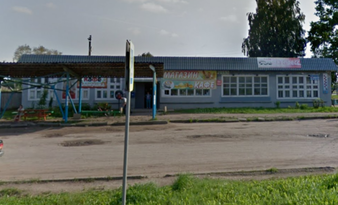 If it was up to me, I'd described every square inch of this photo. Copyright: Google If it was up to me, I'd described every square inch of this photo. Copyright: Google
This is a perfect illustration of why I’m glad I ditched editing-on-the-go. It would be such a waste of time to figure this out without the context of seeing how it fits in the overall work and how it affects the overall flow. Before, I would make sure to clean up the descriptions into a neat few paragraphs before moving on – and then probably having to go through it again on subsequent edits.
Not to say that I’ve completely embraced unfiltered verbal spew. This was never the ultimate goal and in the end I think would make the editing process a bit overwhelming. So there’s still sometimes dialogue or descriptions that I polish off to a certain degree of satisfaction before including them even in the first draft. But generally throwing words down and moving on is so liberating. The trip through the Russian countryside presented an additional challenge that I should have expected. The country retreat, if it can be described like that when there was no central heating or plumbing, as close to rustic living as one could get in 90s Russia, is the one thing I’m so nostalgic for about Russia that it almost manifests in physical pain if I think about it too much. It occupies such a dear place in my heart that I’ve had nightmares of finding it demolished, or more absurdly, replaced with a theme park. For this reason, the choice to set part of my novel in the village of Komkino is an exercise in self-torture. 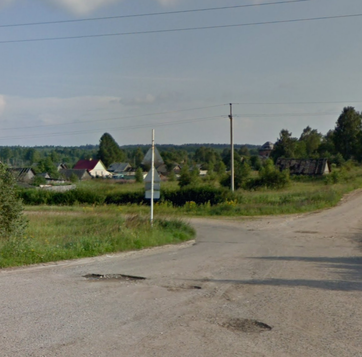 If this was Komkino, I would have to clear my schedule to weep. Copyright: Google If this was Komkino, I would have to clear my schedule to weep. Copyright: Google
Whether it’s the birch forests, the quaint villages of no more than two dozen houses made of dark grey wood, or rutted muddy country roads, each is a small piece of my childhood that now seems unreachable. I know the area has changed in the twenty years since I’ve been there. More and more homes are being converted to dachas, pushing out the year-round residents, who are likely coalescing in the towns. In a way, I’m fortunate that the village itself and its immediate surroundings aren’t actually available in Street View, otherwise I would have spent hours examining every square inch of familiar locations or else find myself awash in heartache at seeing what’s different.
Best I can hope from this exercise is to use Street View to augment my own memories and present to the reader a slice of a place that is very important to me. Whether it will seem like an unnecessary detour in the novel remains to be seen.
As I spend a Sisyphean eternity editing my first novel, I’m busily working on my second one. It went over the threshold from “idea I’m toying with” to full on project sometime in 2018, but overall it’s been slow going since.
As a result of my weird pandemic productivity boost that I experienced in the months before our third baby was born, it more than doubled in word count and is now at a respectable 40,000, though I recognize that a sizeable chunk of it is first draft bloat. I’ve been enjoying this particular project immensely, and a little while ago I talked about how I was using Google Street View to explore the city of my childhood. Despite the level of enjoyment and how well it’s been progressing, I have run into some growing pains, which I think is an important subject for writers to be able to talk about freely. Sometimes there’s this tendency to subscribe to one of two extremes – either you’re a writer to the core and enjoy every aspect of it because it is the essence of your being, or you’re a tortured artist’s soul who is but a vessel for your writing, which rips you to shreds as it crawls out of you. Cute, but not the way things work. I think there’s nothing wrong in recognizing the stumbles we all experience. Writer’s block isn’t a sign of weakness or a disease to be cured – it’s a natural part of the process. It also comes in all kinds of variations from writer to writer and within writers themselves. Not every case of writer’s block is a 100% stupor where no amount of internal turmoil will bring even a single word onto a page. Nice for relatable writer comics, but hardly ever happens. What I’m going through right now with Maple Vodka (placeholder title, so bear with me) is something I like to describe as a “working” writer’s block. Kind of like “working notice” – where you’re fired from a job but stay on for the duration of your notice period. So in my case, it feels like writer’s block, but it’s not stopping me from actually continuing to write, or rather, I’m not letting it. The symptoms I’m currently experiencing are the following: The current chapter is overwrought: I feel like the section I’m writing is entirely too long for the pacing of the novel and how much it actually brings to the plot. It started with the protagonist going to work and then moves into him remembering the long journey that led him to this dead-end job. Sure, it’s important to establish that his career stalled, but is this the best way of doing it? I’m not sure. I’ve certainly found the character exploration fascinating, but will it fall flat with readers? There’s not enough here for a novel: this fear is closely related to the first one – because this particular fiction feels like it’s padding word count, I’m wondering if there’s even enough idea here to stretch into a novel length, or is it all just filler? Sure, it looked good as a synopsis, and then as a full-blown outline, but sometimes when I put meat onto the skeleton I quickly run out of material and end up with a half-dead being of abject horror. Is this the fate of this particular work, or are my perceptions suffering from recency bias, and I just need to get through this stretch to greener pastures? It’s poorly written: hardly any of us do their best work when we’re forcing ourselves. So the last dozen or so pages haven’t felt like the kind of writing that I should be doing. Maybe that means the whole work is utter garbage and I shouldn’t subject anyone to the final product. Equally likely is that I’m too close to this particular piece of writing, and need some perspective in order to properly assess its merits. As I’ve summarized them, these might seem like fairly sizable problems. On a bad day, it’s enough to discourage someone from continuing their work, throwing it in the discard pile, and moving onto the next project hoping this will be the perfect fit. As much as I do think sometimes you do just need to cut ties with something you’re working on, a technique practiced even by the most seasoned authors, I think it’s too early to do a post mortem. Like I said, difficulties are a natural part of the process, and it’s an intricate balancing act to learn when those difficulties are truly insurmountable. In this case, I don’t think the threshold was crossed. Why? I’m not sure. There’s no bright line test here so at the end of the day, I have to trust my gut and believe that the solution to all three of the stated misgivings is: keep writing. 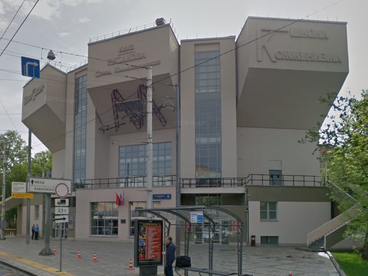 Could have sworn this architectural monstrosity was white, but hey that "School of Communism" sign on the far right was an excellent detail I had no memory of. Courtesy of Google Street View. Could have sworn this architectural monstrosity was white, but hey that "School of Communism" sign on the far right was an excellent detail I had no memory of. Courtesy of Google Street View. The internet can be a powerful and versatile tool in the arsenal of a writer. And I’m not just talking about Googling weirdly specific forensic questions that in the eyes of a law enforcement algorithm make one indistinguishable from a serial killer. The amount of research a writer can do from their comfort of their own living room is incredible, including visiting faraway places without ever having to leave the house. Or, in my case, revisiting long-shuttered corners of my memory in full colour. One of the novels I’m currently working on is set in Moscow, and though that was the city of my childhood, I hadn’t been back there in almost twenty years. My main character shares a lot of the same places that I had grown up around, so you’d think it would be easy for me to replicate the setting. Honestly, if I’d relied on memory alone, it would probably be passable. Any reader who’d never been to Moscow would certainly not know the difference, and even lifelong Muscovites, unless they specifically visited the neighbourhood I was describing, might not immediately notice that something was amiss. That is, won’t notice anything amiss with respect to the general locations and the broad stroke descriptions. Once we dig down to the details we discover the little problem inherent in the passage of those twenty years. The problem is further compounded by the fact that the protagonist finds themselves uprooted from a life as an immigrant to Canada, and placed into an alternative universe existence where he never left Russia. A lot of the novel therefore revolves around the changes that had happened in Russia and Moscow since he moved, and the contrast to the expectations he had of his homeland after a long separation. Memory alone would not permit me the experience to write this well. Short of going back to Russia for a tour myself, something that is presently not possible for me, all I’d have to rely on is hearsay. Not only would someone familiar with Moscow likely see through the inevitable missteps, but it would compromise one of the integral themes of my novel and would be a slap in the face of an ever-changing home city and country with which I share a complicated relationship. 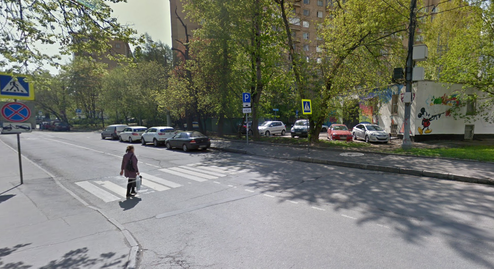 Between the old brick apartment block, the grafitti, and well-marked pedestrian crossing, just this snapshot alone gave me a lot to work with. Courtesy of Google Street View Between the old brick apartment block, the grafitti, and well-marked pedestrian crossing, just this snapshot alone gave me a lot to work with. Courtesy of Google Street View So out came Google Maps. I touched on this process in an earlier post about the novel, but this time, I took a stroll through my own neighbourhood, taking intermittent moments to catch my breath while nostalgia and the slightest touch of what could probably be best described as homesickness gripped my chest. Following the path of my protagonist who traced my own childhood steps not only allowed me to remark on what has changed and what stayed the same, but also lent some more ephemeral elements to help with storytelling. A little old lady captured by the Google Street View camera would turn into a side character; a specific piece of graffiti would inspire an internal monologue in the protagonist. It almost felt like plagiarizing real life. Each of my own observations could be downloaded into the protagonist, since he was essentially experiencing what I was – taking in familiar surroundings after a long separation. When it comes to the first draft, I’m pretty much throwing everything and the kitchen sink at it – every observation, every unlocked memory, gets tossed into the narrative. It’s probably too much at this point. As the novelty wears off and the novel eventually enters subsequent drafts, I’m sure a lot of these tangents would be pruned. In the end, I’m hoping the result is something close to an authentic experience that combines vague memories with refreshed visuals to create a picture of a city. It’s sometimes easy to forget the kind of information available at our fingertips these days. This is an opportunity that just wasn’t available to our predecessors. To write even remotely believably about a place, the writer had to either absorb a multitude of first-hand accounts to paint their own picture or actually be present there physically. Now, for any major city around the world, a simple click of a button and we’re looking up at world-famous landmarks, sneaking around forgotten side streets, or cruising through the countryside. It’s a convenient and reliable way of providing support to a setting we may not have personally experienced. A word of caution is that this is in no way a panacea. I’m not entirely convinced that this method of research would be sufficient for an entire work taking place in a setting that the author has never visited. Visuals go a long way but the feel of a place is harder to pin down through a computer screen. Not to mention the flow of life, its people and its culture. More serious research is required here, though I believe a reasonable product can be achieved here as well, made that much easier by all the other research tools that are brought to us by technology and the internet. The need for proper research, and perhaps some self-reflection as to the advisability of the story/setting combination in the hands of the author, is heightened for certain settings, depending on their relationship to the author themselves. An ethnically WASPish North American author sitting from the comfort of their desk chair may be able to set their whole story in a rural Indian village or the streets of Caracas, but should they? A special sensitivity to place, culture and people is required here, and a reminder that technology is just that, technology, a tool, not the end all and be all of human experience. So like any literal tool in a handyperson’s toolbox, tools should be used with caution and for their intended purpose, but I encourage playing around with dropping yourself into a setting you’ve never been before, and using that to grow your writing. Talking about writer’s block feels a bit like talking about being tired. We’re all tired, we’re always tired, talking about it won’t fix it, and in the end, no one cares. However, given that it has been scientifically proven that if a writer doesn’t spend at last half their waking hours lamenting about writer’s block, they literally detach from the cosmic plane and stop existing, I feel I need to put my quota in lest I suffer such a gruesome fate.
For me, writer’s block doesn’t feel like a wall, rather, it’s more like a writer’s valve. Some days, the valve is open full blast, others days, it’s a moderate stream, or a trickle, or we’re in complete shutdown mode and I’m staring at an empty Tweet for five minutes convinced that I have lost the ability to communicate. Over the last couple of weeks I’ve suffered through one of these partial shutoffs. It’s not like I couldn’t write anything, but my production was slowed. And when I did write, I generally didn’t feel good about the product. I mean, I know that’s what editing is for, but it still doesn’t feel good, you know? As the calm rational individual that I am, I go into full panic mode every time my fingers don’t go berserk the moment they hit the keyboard. Am I sleeping enough? Of course not. Am I eating atrociously? Absolutely (screw you, never-ending Halloween leftovers). Is work super busy and invading my thoughts? Wouldn’t be myself without it. Yet none of this really any different than the status quo, so what’s the problem. Why is my creativity so sluggish that the new novel that I was so excited for just a month ago now has placeholder dialogue like “Sergei says something” and “Then Andrei says something”? I couldn’t answer it, until yesterday. So what happened yesterday? Despite having no sleep, snacking ferociously and being up to my eyeballs in work, I had a breakthrough in that same dialogue, and managed to move the conversation through poking fun of the protagonist and discussed shitty pirated Russian dubs from the 1990s. It wasn’t perfect but I was happy with the result since the scene was now moving along after a couple of weeks of grinding to an almost complete halt. So here’s my theory: my reading feeds my writing. Now, it’s a pretty common sentiment that to be a good writer you need to be a good reader, and I subscribe to that. I’m not going to put some arbitrary gatekeeping minimum that writers should read, but I do believe a good writer needs to read. Yet this idea hasn’t quite hit home as it did now. For about the last month, my leisure reading has consisted of finishing up a biography I had been reading on and off since last October. Now, we’re talking about a 730 page dense tome written in a very different writing style than fiction. So the period of me reading this biography in earnest coincides approximately with the length of my latest bout of writer’s block. Now don’t get me wrong, I’m not trying to crap over non-fiction. While the bulk of my reading comprises fiction novels I do enjoy the occasional non-fiction book and biography and find them both educational and useful in my craft. But dig this: the moment I finish this book and read the first twenty pages of The Hate U Give, the very next day the valve is opened and my writing pours out. Of course, this could be pure coincidence but I choose not to see it that way. As much as a biography is great writing it’s not the writing I do. It doesn’t really contain dialogue, it doesn’t set the scene in the same way, and the “plot” while mostly linear has its own ways of meandering that’s not reflective in fiction. Maybe it is a little worrying that my “writing muse” is so fickle that it leaves whenever I spend more than a couple of weeks not reading fiction, but hey, writers are a fickle folk. For me, this has been a lesson to not stay away from reading fiction for too long, unless I want to see that writer’s valve tighten on me again. Variety is the spice of life and maybe here I need to take a more organized approach at keeping myself spiced up. Some might balk at any suggestion that I should regiment myself, but if Douglas Coupland can recommend eating dark chocolate to get those writing juices going, then I will fully endorse reading good fiction as a possible cure for writer’s block. Today I want to introduce you to a novel project that has been very dear to me for quite some time. I’ve recently discussed my struggle with transitioning into my next novel, and blamed this on my addiction to outlines. A half-dozen ideas are all percolating still in my mind for varying lengths of time, but one project has now crossed the magic 10,000 word threshold for when I consider a novel to actually be in progress. And the two main reasons why this one seemed to pull ahead are that it’s my oldest unwritten projects that I’ve had and because, unlike the rest, it has a fully-fleshed out outline. Old dogs, am I right? The novel doesn’t yet have a working title, partly due to the fact that titles are a bit of a weak spot of mine (or one link in a chain mail armor of weakness). What it does have is a code title for the document, so for ease-of-reference let’s just use that until something more acceptable comes along than “Maple Vodka”. The reason why I refer to it as “Maple Vodka” will become clear soon enough, but first let me tell you a meandering background tale that I insist, at least to myself, will not bore you to death. As you’ve seen from my introduction to my first novel, Wake the Drowned, I brew ideas sometimes for years at a time before they ever see their first words committed to paper. Like Wake the Drowned, Maple Vodka has its roots from over a decade ago. I was still riding the high of having one of my short stories adapted into a short film, an adventure whose telling is best left for another day, and was trying to explore the lucrative screenwriting career I was obviously going to have. Back then, the regrettable Kevin Spacey’s production company, Trigger Street Productions, ran a peer-review site for amateur screenwriters. The premise was if you read and reviewed other people’s scripts, you could eventually post your own script and have it reviewed by complete industry noobs like yourself. For a year I eagerly worked to add my piece of garbage onto the communal landfill (to be perfectly honest, I did read a couple of scripts that were, in my opinion, worthy of Hollywood productions, but the overwhelming majority was similar to my own puerile attempt). 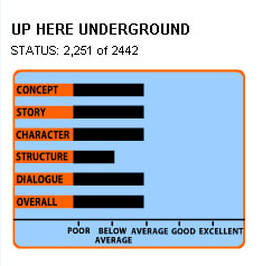 Well it wasn't last, so there's that Well it wasn't last, so there's that After having that script excoriated by the reviewing community, I decided to move onto my next project. This one would serve two purposes – my next script to be offered up to the Trigger Street masses, and also a way of outlining my next novel. As an outline, this was actually a decent idea because it allowed me to hash out my dialogue, which at the time was by far the weakest point of my writing. So I wrote up the first couple of scenes, made the most skeletal of outlines, and like every other large scale project I touched up until that point, off it went into the Land of the Forgotten, sort of. When I decided to take Wake the Drowned to an agent, I thought I would hedge my bets. After bits and pieces of my novel swam around in my head for about four years, on a long walk around the city I decided to hash out the same full outline that I did for Wake the Drowned. The idea was snuck into my email to the agent and because they never addressed it, instead choosing to opine on Wake the Drowned, nothing came of that outline, but it sat there for years on my hard drive whispering into my ear every so often. It's both a project that I’m excited to write, and one that terrifies me in its scope. I describe it simply enough – an alternative biography, a sort of personal alternate history. At least, that’s how it started. Imagine if, at the age of thirteen, I never moved to Canada. What kind of person would I have become? What parts of my personality and my future were shaped by my environment and what was inherent to me? Could I really be considered the same person? These are all the questions my protagonist, Paul, ponders during one of his identity crises, until one morning he wakes up, and finds out he never actually moved to Canada and has to deal with the person that he became in his native country. You see? Russian immigrant in Canada? Maple Vodka? As far as working titles go, I’ll say this one isn’t half bad. In the decade since I first thought of this idea, there have been significant changes, both to myself and my story. Firstly, even though it was going to be a literal exploration of what I would have been like if I had not moved, Paul had slowly diverged from me in terms of personal experiences and personality. Sure, he still shares a lot of my childhood experience and certain traits, but changes needed to be made to provide at least some objective separation, and artistic liberty was required. 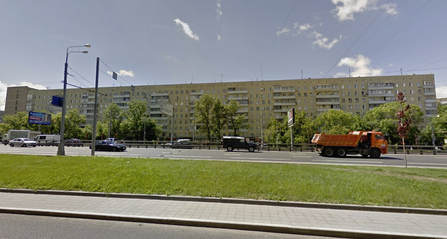 I don't know what I would do without Google Street View. This is what greets Paul on his first morning back in Moscow I don't know what I would do without Google Street View. This is what greets Paul on his first morning back in Moscow The novels relationship to the origin/destination dichotomy had also shifted. The novel was conceptualized to show a very obtuse picture of Canada being good and Russia being bad. But the country I had not visited in almost twenty years has changed in unprecedented ways. At least in Moscow, beautification projects have changed the face of the city, modern apartment blocks repaved outdoor farmers’ markets, pedestrian crossings have transformed the streets. But at the same time, whatever hope remained in the 90s seemed to have been sapped. The country has reshaped itself as a pariah, as one against the world, steering the people against external enemies instead of the internal ones sitting at the top of the food chain. Not only that, but I myself have developed a more nuanced understanding of the relationship between person and place. We are a product of our own free will as much as we are about where we are from. The novel has thus become more introspective to the main character. So as I’m starting to work my way through the first quarter of the novel, all these things are rearing up and threatening to scare me away into safer waters, you know, the ones where I’m bouncing from idea to idea unable to commit. I’ve embraced the challenge of writing about a country I personally haven’t been to for more than half my life, but one that has given me an inexorable part of the soul that longs to write. I’ve got a few windows into Russia I can still use, so I’m not flying completely blind. I also know that this can’t be a long-winded essay about my own opinions. Paul needs to be real to me, he needs to be thrown in this situation and genuinely try to find his way out of it, to genuinely react to the face that he sees in the mirror. So there it is, what is likely to become my second novel if things go well. Meanwhile, I should write some outlines, otherwise I’ll have nothing to do once this one is done. |
Michael SerebriakovMichael is a husband, father of three, lawyer, writer, and looking for that first big leap into publishing. All opinions are author's own. StoriesUrsa Major Categories
All
Archives
January 2024
|
Proudly powered by Weebly
 RSS Feed
RSS Feed